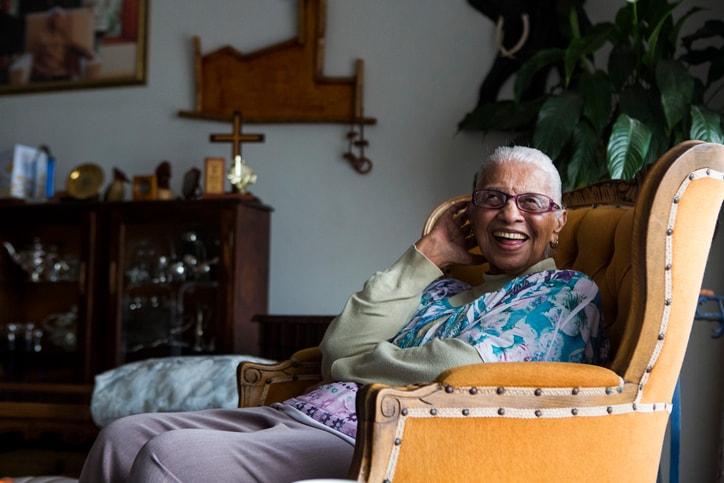When my friend Morgan began caring for her father, I remember being surprised. I didn’t know Morgan’s dad was even alive. She never spoke of him and I had assumed he had passed away years ago. Apparently Morgan’s dad had abandoned the family when Morgan was five, leaving her mother to raise four children on her own. Morgan’s memories of her father were dim. He could be charming and erratic, playful and unkind. What Morgan remembers most about her father was that he just wasn’t there.
So why did Morgan make the choice to care for her father during the last year of his life?
When I wrote my book, My Parent’s Keeper: The Guilt, Grief, Guesswork, and Unexpected Gifts of Caregiving, I interviewed numerous family caregivers who cared for their parents out of a sense of duty, devotion and love. But I wondered about those who cared for parents who had not cared for them. How did they assume the role of caregiver for a parent who neglected, abandoned or even abused them? What motivated these adult children to give back when they had not been given to?
When Morgan became a family caregiver, her childhood image of an angry and narcissistic father was replaced by a frail old man who was dependent on others for his day-to-day needs. “I never tried to undo the hurt or pain my father caused,” explained Morgan. “That was not possible.” Nor did Morgan assume the role of primary caregiver. But she did manage to connect to this man—who was a father in name only, but also the only father she had even known. Seeing her father as vulnerable and dependent lessened the anger Morgan had harbored for so many years. “I was able to find a well of compassion I didn’t know was possible,” she explained.
Assuming the care of a parent who didn’t adequately parent you is a complex and highly personal decision. And there are risks. Adults who endured childhood mistreatment tend to be more vulnerable to depression when caring for their abusive parent. Still—most people feel it is their responsibility to assume the role of caregiver and rarely call it quits.
Sometimes, however, the risks of caring for a neglectful or abusive parent are just too great. When a parent is so toxic, the proximity of caregiving may threaten significant psychological harm. In those cases, the adult child may feel that the only real choice, as drastic as it seems, is to walk away.
Dylan, a shy 28-year-old who struggled with anxiety and depression, moved in with his 64-year-old mother after his parents divorced. Dylan’s mother suffered from liver disease—the result of many years of heavy drinking—and was unable to manage on her own. Dylan was barely able to care for himself and was even more unprepared to care for his mother—who, despite numerous interventions and treatment, was still actively drinking. As their fights escalated, Dylan felt increasingly trapped in the role of caregiver for a mother who had tried, but not succeeded, in caring for him. During one ugly altercation, Dylan threatened his mother with bodily harm. While he didn’t act on this threat, he knew the situation was unsustainable. Dylan made the difficult decision to move out and asked friends and family members to step in.
Those like Dylan who were raised by an impaired or neglectful parent may be at risk of being embittered by the trauma they endured. While letting go of past hurts may be liberating, it is not easy. Making peace with your parent does not require forgiving their sins. Seeing your parent as a highly flawed human with their burdens and baggage may help. During the time that Dylan lived with his mother, he became curious about her life. He learned that his mother grew up with an alcoholic, abusive father. Dylan’s mother had desperately wanted to provide her children with what she herself never had. Sadly, she was unable to escape her demons and fell victim to the same terrible disease that claimed her own father. Not long after Dylan’s departure, his mother died. At her funeral, Dylan spoke with painful candor about his feelings. “I never hated anyone so much in my entire life. And I never loved anyone so much either.”
According to Dr. Richard A. Friedman, professor of clinical psychiatry at Weill Cornell Medical College, “Even the most abusive parents can sometimes be loving, which is why severing a bond should be a tough and rare decision.” Given that over 80% of long term care in this country is provided by unpaid family members, caring for our parents, even the difficult ones, remains a cultural expectation. While the Ten Commandments call on us to honor our father and mother, we must also honor ourselves. As fellow caregivers, we can hardly judge those like Dylan who make the decision to walk away. You have to recognize when you are at your limit and at risk of causing harm to your parent as well as yourself.
Reaching out for help and support is crucial. Finding a good therapist and joining a support group can help you manage the emotional demands of caring for a parent who didn’t adequately care for you. Hiring paid caregivers through local home care agencies or online resources can ease the burden and guilt of feeling like you have to take on more caregiving tasks than you can handle. Area agencies on aging are also a tremendous resource and can give you free advice and help identify local senior care providers and services.
The truth is that none of us gets to choose the parents we are given in this world. Some of us win the birth lottery, while others have to make their way through life with less than adequate parenting. You can’t change your parents, and in most cases, you can’t rescue them either. But you can focus on the present and choose not to be broken by the past. As a caregiver, you may even find some kernels of good, despite all that was bad. With the right approach, attitude and support, you may be able to find compassion for your very flawed parent—and for yourself.
Jody Gastfriend is the Vice President of Senior Care at Care.com and author of “My Parent’s Keeper: The Guilt, Grief, Guesswork and Unexpected Gifts of Caregiving.” Follow me on twitter.
This article originally appeared on Forbes.com





